
Dr. Yutaka Niihara takes innovative treatment from LA BioMed to spin-off company Emmaus Medical to get pain relieving therapy on the market for patients who need it.
Compassion Leads to Pioneering Treatment for Sickle Cell Disease
Dr. Yutaka Niihara takes innovative treatment from LA BioMed to spin-off company Emmaus Medical to get pain relieving therapy on the market for patients who need it. A man of great compassion, Dr. Yutaka Niihara has made the study of sickle cell disease his life's mission. Now, 22 years later he is changing the lives of his patients in ways they could only imagine through an innovative new treatment.
In his early career, Dr. Niihara thought he would focus on cancer. Then he began to see sickle cell disease patients as part of a hematology rotation. "I saw the intense pain they endure," he says. And it moved him. The only option he had was to prescribe pain medication that worked on a limited basis at best. There were no drugs specifically to treat the pain of sickle cell disease and there is no cure. Because of his thoughtful, caring bedside manner, sickle cell patients began to ask for him. Sickle cell disease became his focus. And so began a 22-year research odyssey that resulted in potentially the first new treatment for this disease in two decades.
In the Beginning
When Dr. Niihara began his sickle cell research at LA BioMed, most scientists were focusing on genetic cures. Because he had witnessed firsthand the terrible pain his patients endured, his focus was on practical ways to relieve this. He began his research under the mentorship of Dr. Kouichi Tanaka and Dr. Charles Zerez. Together, the team looked at the defects and damages in sickle-shaped red blood cells and studied ways to make the cell perform more normally. By 1994, Dr. Niihara and the team had a theory and a potential solution. They discovered the amino acid L-glutamine stimulates production of a molecule that reduces the damage to the sickle red blood cells.
As a result, the treatment helps prevent blockage of small blood vessels by the damaged sickle-shaped cells so that blood circulates better. It also reduces painful episodes and decreases the tissue damage that occurs with each. That same year, Dr. Niihara undertook a Phase 1 clinical trial to test his findings on sickle cell patients. Since L-glutamine is naturally occurring in the body, there were hardly any side effects.
Steady Success
Because of the success of the Phase 1 clinical trials, Dr. Niihara conducted Phase 2 concluding in 2008 and Phase 3 concluding in 2013. For the Phase 3, 231 patients were enrolled at 31 locations throughout the U.S. Results have been very promising. Currently Dr. Niihara and his team are analyzing data from the trials. "LA BioMed offered us help and support each step of the way," he notes. Despite such promising results early on, no big pharmaceutical company was interested in developing or marketing L-glutamine. Sickle cell disease is relatively rare. Pharmaceutical companies deemed the cost of developing and marketing L-glutamine outweighed the potential profit of serving few patients. Dr. Niihara, who by this time had patented L-glutamine therapy as a potential treatment, faced an uncharted path for pharmaceutical development and distribution.
Emmaus Medical, Inc.
LA BioMed again stepped up. "LA BioMed suggested we form a spin-off company to complete the development and market L-glutamine because the trials were promising," Dr. Niihara says. So in 2001 after completion of Phase 1 clinical trials, he co-founded Emmaus Medical, Inc. The NIH, FDA, and Dr. Niihara's family and friends supplied the initial money needed for additional clinical trials and start-up. By this time, his research was a labor of love. As trials continued to show potential, Emmaus Medical acquired staff and dedicated itself to the commercialization of innovative and cost-effective medicines. The group hopes, with FDA approval, that L-glutamine will be its first project. To date, the company has raised over $40 million with the help of many, including LA BioMed.
The Future
Currently, Emmaus Medical is working toward FDA approval of the treatment. Patients who were enrolled in the trials are anxiously awaiting the chance to go back on the therapy that helped them feel so much better (see Juanita Gougis' story on page 2). The company is poised to market L-glutamine to all those sickle cell patients who need it. Reflecting on the process of developing L-glutamine therapy, Dr. Niihara says, "I am very grateful to LA BioMed. If I worked in another place, I'm not sure I could have persisted for 22 years to develop an effective treatment. There is really a culture of giving here among staff and researchers. They are interested in our success."
He went on to say, "I appreciate that LA BioMed gave us the chance to start a company. I hope to repay them so they can continue to bring good things to the world." Dr. Niihara also values each patient who participated in the trials. "To me, patients are my teachers. They have taught me about life and given me perspective. It's a privilege to be engaged in this process," he says with admiration.
LA BioMed salutes Dr. Yutaka Niihara and his dedication to helping patients with a potentially new therapy for sickle cell disease. Because of the partnership between LA BioMed and Emmaus Medical, these patients may soon have a new lease on life.
